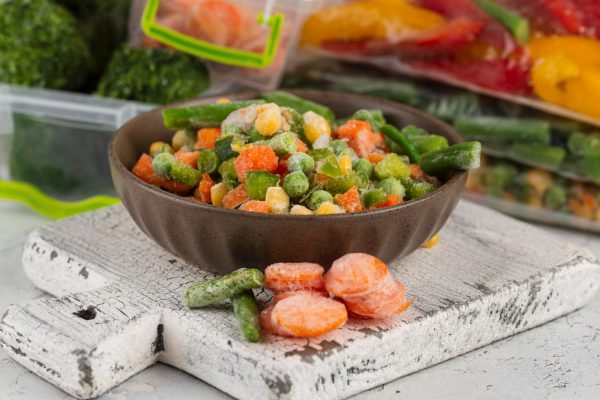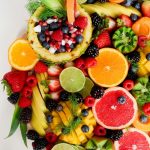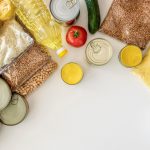Now that we are reaching the colder side of the year, suppliers are going to ship fresh produce to your local grocery store from further and further away. In fact, according to the Fruit Growers Supply Company, the average fruit or vegetable in U.S. stores travels at least 1,500 miles before it reaches your grocery cart.
Once it arrives at the store, it may sit on display for several days, then it will linger in your fridge or on the kitchen counter for a while. That means a long gap between harvest and your dinner plate. And during that time, nutrients begin to fade.
To make matters even worse, farmers typically pick fresh produce before it’s ripe. It never even has the opportunity to reach peak nutritional value in the first place!
While that may sound like bleak news, there’s a simple solution to this problem that may surprise you.
❄️The Frozen Food Advantage
Most people assume that fresh produce has a higher nutritional content than frozen. But in most cases, that’s simply not true.
When farmers flash freeze ripe produce right after harvest, it is at peak nutritional level. And the vitamins, antioxidants and phytochemicals in them don’t degrade over time the way they do with fresh produce. Those nutrients are “locked in” during the blanching and freezing process.
This is a topic that actually has research behind it. A University of Georgia study compared eight foods — blueberries, strawberries, broccoli, cauliflower, corn, green beans, spinach, and peas — in both fresh and frozen form.
And guess what?
The authors concluded that, as far a nutrient content was concerned, “…frozen produce outperformed ‘fresh-stored’ more frequently than ‘fresh-stored’ outperformed frozen.” They also noted that “the findings of this study do not support the common belief of consumers that fresh food has significantly greater nutritional value than its frozen counterpart.”
And for blueberry lovers like me, here’s a bonus: frozen berries actually contain more anthocyanins, the powerful antioxidants that give them their deep color and health benefits. I consider that a huge benefit!
Ultimately, unless you pick something from a garden in your yard or purchase it from a farmer’s market where it was picked yesterday for sale today, you just can’t beat the peak nutrition found in frozen produce.
🫐🥦🌽How to Choose the Best Frozen Produce
Frozen fruits and veggies are just as healthy as fresh, and often even more so. Still, for even greater health and nutritional value, I recommend buying organic brands whenever possible.
Compared to commercial fruits and vegetables, organic produce contains up to 69% more flavanones, 51% more anthocyanins and 28% more stilbenes. Plus, they don’t have lingering herbicides and pesticides the way commercial produce does.
But you do need to read the labels on those frozen foods to make sure they don’t have any added salt or sugar. And you want to avoid frozen vegetables that are pre-seasoned or packaged in sauce. They will be full of sodium and preservatives.
One of the big bonuses of buying frozen is that all the hard work has been done for you. Everything has already been washed, peeled, sliced and diced.
And you don’t have to worry about spoilage. A head of broccoli, a bag of fresh spinach or a box of strawberries won’t last long in the fridge. But when you buy them frozen you can store them for about a year before the quality starts to deteriorate. So you have plenty of time to use them without worrying that they’ll go bad.
You can cook frozen veggies much the same way you cook those that are fresh. They can be sautéed, steamed, broiled and even grilled. And it’s very convenient to be able to pull just a handful of spinach, peas, carrots or other vegetable from a bag to toss into your soups, sautés and casseroles.
SOURCES:
Mazzeo T, Paciulli M, Chiavaro E, Visconti A, Fogliano V, Ganino T, Pellegrini N. Impact of the industrial freezing process on selected vegetables -Part II. Colour and bioactive compounds. Food Res Int. 2015 Sep;75:89-97.
Li L, Pegg RB, Eitenmiller RR, Chun J-Y, Kerrihard AL. Selected nutrient analyses of fresh, fresh-stored, and frozen fruits and vegetables. J Food Compost Anal. 2017;59:8-17.
Lohachoompol V, Srzednicki G, Craske J. The Change of Total Anthocyanins in Blueberries and Their Antioxidant Effect After Drying and Freezing. J Biomed Biotechnol. 2004;2004(5):248-252.
Barański M, Srednicka-Tober D, Volakakis N, Seal C, Sanderson R, Stewart GB, Benbrook C, Biavati B, Markellou E, Giotis C, Gromadzka-Ostrowska J, Rembiałkowska E, Skwarło-Sońta K, Tahvonen R, Janovská D, Niggli U, Nicot P, Leifert C. Higher antioxidant and lower cadmium concentrations and lower incidence of pesticide residues in organically grown crops: a systematic literature review and meta-analyses. Br J Nutr. 2014 Sep 14;112(5):794-811.



